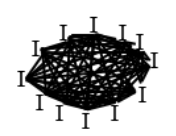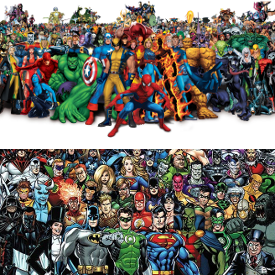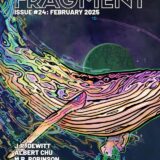
A story of labor, the work of families and generations, the monetization of work and effort, and the idea of independence from the family and from the labormodel as a whole. How do you do that in such a unique future?
On Europa, an I must measure every task in watter.
When WeI reunites with the Family after 21 Brain-Watt-Years (Ƀ₩¥), the separation magnitude doesn’t impact the social ritual: WeFamily circulates water-clock tea-bowls — ceramic cupped-hand sculptures — for every I to fill, to the three-quarter Brain-Watt-Hour mark; then punctuates conversation with sips at the respectful drip-rates. In Eurolect, tshy means, simply, “hotwatter.” No herbal solvents like on Urth; just hot baths for throats.
At first, conversation is sparse; the social engine coughs, chokes, struggles to sustain a combustion cycle. To Family, there’s nothing to say, only cultural scripts — algo-rites — to actuate. Eyes exchange stares, mouths ping pleasantries, faces sign handshake protocols.
And WeI’s nerves tingle for the watter that must soon be spilled.
#
“Is it Way or Why?” asks Professor Samson-Holtz, during office hours.
“Actually, it’s We-I.”
“Wee-Aye, Weeyai. Hmm.”
“Sort of. More like two words: We, I. But the second’s whispery.”
“WE…high.”
“Very close. Best I’ve heard on Urth.”
Samson-Holtz looks pleased, gullibly flattered.
“It’s not even my full name, though. WeI’s just the first-person pronoun. Well, Eurolect has no proper first-person singular; everyone’s referred to in the third. Every pronoun, name, is prefixed ‘We.’”
Samson-Holtz frowns, as though WeI’s culture, however interesting, missed some mark. “Ah.”
“Usually rude or over-direct to say You, for example. An I says ‘WeYou.’”
“Oh — apologies.”
“No matter. Urth’s…different.”
Samson-Holtz tries performing relatability again: “So, it’s like Chinese names. Family first.”
WeI chuckles. “May seem that way. But no.”
“When I first read your name, I thought the Chinese name Wei. But —”
— you don’t look Chinese. “Wei is fine. Everyone calls me that. Again, ‘WeI’ isn’t even really my name. It’s short for WeI-Banalyst-Sa-5. Eurolect names also contain the ‘I’, so —”
“No, I’ll get it right. We-hi, We-hi.”
…so it sounds weird to hear “WeI” anyway, because in Eurolect, it means you’re referring to yourself; you should call me WeYou. But he’ll never get it right, and WeI doesn’t care; sometimes names are just algebra.
“We-hi. We,-hi.”
WeI suppresses laughter; he sounds like a donkey.
“Forgive my ignorance. So what is your background?”
Such “background” checks WeI found exhausting. “Europa.”
“Europa?”
WeI nods. Where else do folks speak Eurolect, dummy.
The Professor looks stunned, as though he’s just discovered new decisive academic jargon. “Given Europa’s historico-economic significance, we hear about it all the time, but, well, you’re my first real Europan!”
Yay. WeI’s an exoticist prestige-token to brandish at your next Wine-and-Cheese. “We are real. Just very few of us here.”
Samson-Holtz laughs, then turns morbid. “It’s a…six-year…?”
“Seven. By space train.”
#
Twenty-one Ƀ₩¥ ago, WeI had the anomalous fortune of being awarded a Supreme Solar School of Business “Indigené” Scholarship. The program begins on the seven-Brain-Watt-Year-long Urth-bound space-train itself, and was designed to “advance” the lot of “extra-centra-planetary” subjects like WeI. It accomplishes this, but also subsumes them into the Urthan hegemony: not only by altering consciousness, but by twisting a cruel economic dilemma. First, upon receiving the Scholarship offer, an I must ask: Does I betray Family Duty of so many Brain-Watt-Years payable to the trans-generational Pensionary? And then, after all that travel and learning — such distancings — Does I still even have a Fam? And does I even care anymore? Enough to spend so many years traveling back there? For what? A shittier life in that shithole now appearing all the shittier thanks to this shit-don’t-stink educatin’? To become an outcast with no skills applicable to moon-colony work?
The Powers-That-Be know of this asymmetric tradeoff. They don’t worry about publicly-displayable Scholarship Recipients returning “home,” where their knowledge wouldn’t be believed or understood.
But WeI weirdly discerned a different equation. Contrary to all Pareto-Optimal expectations, after graduating with the official Sun-sign-sealed (=☼) fF.dBSSSBὬ decree, WeI boarded a seven-Brain-Watt-Year space train once again: back to the backwater data- and water-mining colony Europa.
No “Indigené” Scholar had ever attempted this.
#
And WeI-Banalyst-Sa-5 rides not just any space train.
WeI selects The Pillars of Qatr, whose base structure, however run by the Truly Sunsetless Empire, has long since reticulated into a multi-tailed hub of sub-trains. One branch harbours a parasitic module membrane functioning as a sovereign anarcho-syndicate called The Chrysalis.
But this time, WeI notices various touristic co-optations: cyst-like peddlers selling glossy postcard-reprints of Karla Mark’s The Means of Reproduction to be either smoked or coffee-tabled rather than data-ingested (“…The uterus had been the biological equivalent of a shopping bag; and its output, pounds of flesh…”) appeared incongruous beside vending-arcade machines silk-screened with Weiss’s painting of Kafka’s “A Message from the Emperor,” networked to a supercomputer for simulating zetabyte-sized philoso-ontologies.
But at WeI-Banalyst-Sa-5’s mention of the former, OOmphalos shrugs. “Our host produces ever-evolving anti-bodies. The Chrysalis counters, and the host counter-counters, as in any cryptological dialectic,” gesturing to an art display of mirrors arranged with Rube-Goldberg intricacy, designed to induce in the observer a sense of dimensionlessness which oversized egos found nauseating (hence the canned Applause! audiotherapy being offered next door). Meanwhile, over that way there, a good performance of a half-decent RNA protein-transcription poem of ~0.5 Ƀ₩Đ worth of Kolmogorov Complexity could purchase an I a pocket-sized, one-time re-3D-printer-microwaveable ferrofluid replica.
The Chrysalide economy orbits around the manufacture of Philosophy-Poems (“the genre of Parmenides and Lucretius,” O likes to remind, being especially fond of the physicalist extensions of Emanuele Severino’s philosophy). O’s ilk say that space trains are to Poetico-Philosophy, and their altered states of consciousness, what particle accelerators are to quantum physics. When WeI lived upon this train before, WeI could only sneak select visits to The Chrysalis. Now, WeI lives here.
WeI-Banalyst-5 shall distill the contour of those seven Brain-Watt-Years aboard The Chrysalis as an interminable conversation between old good friends reunited.
“Riding the train again,” says OOmphalos, many times, and at many times.
Ostensive O permutes several baked-goods effigies upon the 3.5-dimensional chessboard, triggering the tele-taster to send the preferred agonists through WeI-and-O’s intravenous peripherals. In s-train culture, O’s saying is triune greeting, fact, adage. The phrase works just as well when WeI first boards the train, three Brain-Watt-Years into the journey, or whenever-day-else: riding again, not still. The phrase’s echo-crystal across space-time is elaborate and vast.
“As is O,” responds WeI.
WeI–AND-O stands in a small study, gazing upon a frame of reference gradually uncurtaining the celestial bodies interceding Urth and Europa.
“O never stops riding,” says O.
“And why’s that? Why choose to work and live aboard the train?”
WeI has heard this story many times before, because WeI thirsts to hear it again — both like a child at bedtime, as when WeI and O first met, and as a desirous adult hungry for distraction, phatic exchange, and conviction-reinforcement — and because O conjures pleasant variants every time. So, WeI has never heard this story before.
“Once upon a time, the problem with Urth hegemony,” says O, “was/is the problem with all planets: time-concepts. When an I spins round with seasons around which to develop rituals and habits and expectations and present-perfect verb tenses, I builds Time around repetitions. For centuries after Copernicus, Urth culture remained as geocentric as ever.”
O taps the geo-mineralization constituting O’s skull.
“But see how much perception changes now. Upon this s-train of thought-acceleration. Of course, it circles ‘around’ too, but an I knows it yet never experiences it. An I can never rationalize that circlet whose span exceeds perception. Had the Babylonians perceived life as linear, then never may they have found need for pi. Even for its constant passengers, the train is a line. Spatio-temporally curvilinear, non-Euclidean; but thermodynamically? Linear. And so, You-and-O does not circle the sun. There’re no seasons. There’s only the discrete trajectory of watts living from and to.
“’Course, Urth’s no different; but, even post-Ptolemy, the sun in language and sight continued to ‘rise.’ Humans clung to repetitive comforts concealing life’s mono-directionality.”
“There are those who stockpile each day into the next —” WeI recites.
“— and there are those who plot a singular trajectory for all their life’s watt-days as a crystalline whole.” O’s “watt” sounds like “what.”
O pauses, then, with infinite patience, an indifference to overt productivity at which most Urthborn would balk, grow antsy, or interrupt. But WeI knows Chrysalide story-art well enough to relish the fermata of rest to reflect until the speaker resumes rearranging taste selections across the paratextual chessboard:
“The steam-age locomotive recreated the concept of time around itself. Suddenly, clocks, schedules, communications, economies all depended on when the trains arrived. Trains are always late because they’re never: it’s organisms who are late, by the entropic pendula of tonnage. Trains are the clocks. Just look: for centuries, now, momentum-savings-maximizing trains orbit our life-sized calendrical orrery: the stars. Trains are the solar dial’s hands!
“The locomotive even formed the basis of Einstein’s thought experiment on special relativity. Could the sur-brain-wattful Einstein have so well redefined space-time as relative reference frames without reference to the locomotive as a frame of reference?”
The kȏan-like query is not meant to be answered but savored.
“Mmmmmmm.”
O’s story conditions the mantra by which WeI recharges WeI’s life-long vision: to revolutionize Europa. By reconceptualizing Time.
#
The Family’s awkward silences misleadingly homophonize O’s fermatas, but WeI pretends them for such use.
WeI recalls reading how, in the early-twenties-centuries, the word “family” signified a particular conservative state-sanctioned hetero-reproductive primogenital wealth-transfer ritual under the ostensible pretext of “love” and class-privileged “happiness,” especially eugenic self-love for one’s high-Jaccard-Similarity phenotypes. Then, commercial enterprises co-opted “family” to allay waged-worker properties’ feelings of alienation, but ironically, this usage represented a return to older-longer space-time structures: the Latin familia, “servants of a household,” and famulus, “slave/robot”: sentient chattel. Which makes WeI a kind of “drapetomaniac.”
But: there is no genetic favoritism on Europa. Worse, new bodies get assigned to sub-Family structures arbitrarily. Thus, WeI has no love for the other Is of WeAll. L’Ove has meant only “loyalty to The Duty.”
WeI exiles the silence: “WeI the Sun-sealed, fF.dBSSSBὬ-decreed, Vicar of Urth, has been dispatched to assume Execution of this Colony.”
WeFamily sips the tshy faster.
“WeI-Banalyst-5 is not WeSeo,” says WeSeo-Fa, the Family-Head.
WeI’s next statement protrudes from the sip-percussed silence like a teetering cantilever of a half-constructed bridge or karate kick: “By L’Ove from Urth, there will be no more Seo-Fa as such.”
WeMP-Resources slips charges under said bridge: “Neither policy, process, nor precedent justifies such a neoplasm.”
WeI disarms the charges: “WeI invokes the Rule of Meritocracy.”
WeMP-Finance imposes a bridge toll: “Perhaps WeBanalyst-Sa-5 means certification.”
“Exactly,” says WeI, and cites an obscure law’s sub-sub-paragraph. “This has never before been invoked, because no Europan who’s gone to Urth and gained certification has ever returned. Nonetheless — it is law….” WeI turns, then, to WeSeo-Fa: “What are WeSeo-Fa’s qualifications to manage this colony?”
WeSeo-Fa answers immediately: “Custom, inheritance, life-long experience, and general approval.”
“And are you sun-sealed with the computationally verifiable signature of a fF.dBSSSBὬ decree? Do you possess a unique ☼-key such as 7504539909-7702267837-0126705531-2398510809-7582441764-8712459866-7274561529-1225063964-4937705743-0218081259?”
Yes, WeI had to memorize this proof-of-work, to tongue-whip it now like a cudgel.
The number impresses silence upon the room. Finally, WeSeo-Fa remarks, “Urth…is a long way off.”
“Agreed. And that is why WeAll shall no longer exploit WeAll for Urth’s sake.”
WeFamily stares at WeI indifferently.
“Even if,” says WeSeo-Fa, “the certification sub-sub-paragraph holds watter, WeBanalyst-Sa-5’s certification’s value is easily outweighed by energy equivalence. In Brain-Watt-Years, WeBanalyst-Sa-5’s cert is worth but seven. And, having abandoned Europa, WeBanalyst-Sa-5’s Pensionary is empty. WeYou is outnumbered.”
Defusing the double entendre, WeI rejoins, “No: wattage is a non-issue. The cost of WeI’s sur-certified presence was, in fact, twenty-one Brain-Watt-Years. Seven to Urth, seven there, seven back. More importantly, Urth’s urth designation trumps such enumerations; its political-weight quantum is insuperable. Regardless: WeI wishes not to play language games, to pass bureaucratic checksums. WeI is here to let the facts assert their own authority.”
Dissimulated surprise: “Oh? Which facts?”
#
And then, for the first time in fourteen Brain-Watt-Years, WeI sees it: Jupiter. Up close.
Or, as WeAll calls it on Europa, Promethea, upon which no Europan can gaze but through the psycholinguistic grille of its namesake’s legacy. Not a celestial body, but a solar-political context. Besides, it’s another of WeI’s favourite philosophy-poems, so WeI is obliged to sporify it.
In Europan lore, Founder Promisethé-Us negotiated the nuclear disarmament of Urth through economic incentivization.
“In the twenty-first century,” Promisethé-Us seminally declared, “an attention-needy Comedian once proposed H-bombing the poles of Mars to melt its arctics and warm the planet. Of course, poisoning la terre with Plutonium-239 would’ve defeated the purpose of terraforming!” With terra-, Promisethé-Us stuck out his tongue: “To gargle a disgusting, geocentric term — yech!
“But the Comedian was off by one order of planet, see — and by magnitudes of bombs. What the Comedian should’ve suggested? Bombing almighty Jupiter! And with all the bombs. The gas giant already shrinks gradually, see, as its Urth-sized high-density liquid-and-solid-hydrogen georeactor heats under the extreme pressures of contracting gases in its voluminous atmospheres above. Had Jupiter been about fifteen percent more massive, it would have been a brown-dwarf, a so-called ‘failed’ star, and, if about seventy percent more massive, a star proper. Urth’s solar system would’ve been binary. Seventy-percent’s how much more massive the gas-giant must be for its core to sufficiently densify to fuse hydrogen into helium, igniting the nuclear reaction cycle worthy of stardom.
“But! New research mathematically demonstrates we could temporarily simulate this cycle nonetheless! Jupiter already radiates more heat than it receives from the Sun; by increasing this heat, we could thaw all of Jupiter’ moons to temperatures hospitable for life.
“Seventy-nine moons! A solar system in its own right! Within our own, yet, larger! And some moons? They have water. Salt water, yes, but unpolluted, refinable. We’d be kickstarting the terraforming of seventy-nine planetoids all at once. Mars? Ha! How naïvely did we quicksand ourselves neck-deep into that scandal of a sunken-cost fallacy! Yech!
“That is why, friends, solaformation is the answer. We can solaform Jupiter into…yes, not technically a ‘star,’ but nonetheless a workable nuclear reactor.
“And with Urth’s ecological collapse…what have we to lose?”
The economic incentive was regrettably atavistic in its colonial pioneering approach: for every warhead launched, a corporation could claim a stake of Jovian lunar land or water. Yet suddenly, nuclear weapons, that indispensable geopolitical currency, had found a better bargain.
“But what’s so peculiar about this history,” OOmphalos chips in, “is it’s the narrative equivalent of a lenticular ambigram: shift the sunlight and Jupiter’s not a sun.”
“Yes,” nods WeI. “In Urth’s Lieburies, I discovered historians arguing Promisethé-Us did not succeed in denuclearizing Urth and igniting Jupiter in this way. Rather, they argue this massive transfer of nuclear energy from Urth to Jupiter occurred much later, when Europa had developed nuclear weapons of its own. These, in conjunction with their near-monopoly of water, gave Jovians extraordinary leverage to subjugate Urth.”
In this version (too blasphemous for WeI to include wholesale in WeI’s Thesis), Urth united politically only because of a perceived common “barbarian” periphery. Urth launched interplanetary missiles at Europa, whose military successfully diverted them into Jupiter. Thus, only by measly chance did humans discover the art of pseudo-star-making.
It is through this historical grille that Promethea sucks the tears from WeI’s gaze. “Jupiter is a weird syntho-pseudo-star — but it’s Europa’s star.”
“And also a pseudo-myth,” O says. “Impossible to electrolyze its science-myth narrative molecule.”
#
“Which facts?” WeSeo-Fa repeats.
But WeI doesn’t miss a beat. “Facts that falsify the Family’s very measurements of Brain-Watt-Years with respect to watter productivity.”
“Nonsense. WeNa’-5, you know the way things work here. Those facts are immutable. You has three choices: go back to Urth, and stay there; go back to Urth, and obtain superior decree; or, stay on Europa and live-work as a Europagan, as you once did.”
WeI befriends the silence for a moment, but not out of hesitation; rather, as a pedestrian welcomes a soft cat circling the ankles. “WeI discerns a fourth option.” Silence again, then a knife: “WeI stays here, but will not work; will not pensionize watter. Not in the way YouAll wish.”
#
Some Brain-Watt-Weeks after that first Jupiter close-up, The Pillars of Qatr slung-shot like a roller-derby relay around the punchbowl of Jupiter’s gravity well. The Pillars now nears Europa’s scarred-ice pearl, where various shuttles have already prepared to intersect in-situ with the space-train, which never comes to rest save relatively to such shuttles.
“What’re you looking at?” asks OOmphalos.
“The wattage-destiny of WeI’s negentropy,” says WeI.
#
Yes, on Europa, sitting before the Family, WeI subordinates the present WeI to the output of this lifelong-protracted process, a “program” whose execution now feels automatic and prescribed by the overwhelming probabilities imposed by past Is, rather than something from which the present I, puppet-like in that sense, could consciously deviate. WeI has relegated WeI not to live a life, but to behave as a component of that vast plan whose momentum is as unstoppable as the space-train on which it was architected.
Not to live: so that others might, someday.
Noble, selfless? Or stupid, idealistic?
Don’t religionize WeI into some martyr.
#
“You and O will never meet again, y’know.”
“WeI knows.”
O pauses, smiles. “Riding the train again.”
WeI’s face mirrors O’s. “We knows our conversations so well, Omphalos, We lives them; We won’t stop to ride.”
“Neurologically, the U-and-O polycule shall continue convening.”
And then The Chrysalis excretes WeI into a bumblebee-shaped shunter-shuttle.
Now, relatively below, from this careening altitude, WeI’s shuttle jets just past the protrusion of Pwyll Crater’s Zinc Pilum. The Pilum’s topmost segment is a space-grain-elevator, from which the last module-cars hauling megatons of Europa’s golden export — purified water in various states — are being launched and coupled to the s-train.
WeI speaks with no one, lost in contemplation. O was right, Europa was shaped by space-trains, too — space-time-trains. During Europa’s Foundational Period, Urth launched two high-speed, unmanned space-trains. Those were the early days, when idealistic visionaries, in the spirit of Quebecker Charles Bombardier, still imagined 3000 km/s (about one-third lightspeed) to be practicable. As it turned out, accomplishing that speed wasn’t the problem, but rather the logistics of rendezvousing at that speed. The whole advantage of space-trains was eliminating the most energy-expensive segments of space transport — launch (acceleration) and landing (deceleration) — by maintaining quasi-perpetual momentum in the relative frictionlessness of space, subsidized only by the occasional gravitational flyby and on-board propulsion. In short, space-trains made space transport scalable. But, this advantage vanished if the train’s speed increased the cost of launching goods onto the train itself — loading-and-unloading, coupling-and-decoupling — at all of its various waypoints. Gradually, human hubris adjusted to the selfless, sometimes trans-generational reality of space transport.
As O’d say, “What’s the rush? We’re already somewhere: here.”
“Well, there’d been a rush when Urth’s water supply was in jeopardy!”
“Ah, but that, too, assumes beings are obliged to perpetuate their particular biomatter forms indefinitely into further entropy-denying negation signatures.”
“Yeah! Instead of just, y’know, fuckin’ being.”
#
“Not pensionize water?” says WeSeo-Fa. “Impossible.”
“Possible and probable.”
“You misunderstand. You already has been marked as pensioned. In a special sense.”
#
It isn’t hyperbole to describe the Zinc Pilum Anode at Pwyll Crater, now heeling a frame of reference below WeI, and its Copper Pilum Cathode counterpart at the Conamara Chaos cluster of lineae and lenticulae, as cosmic javelins thrust deep into Europa’s juicy ice-flesh. Both of these Babel-dwarfing super-structures must be among the tallest that primates ever constructed, and certainly the longest projectiles. Basically, each Pilum is a massive hollowed hexagonal prism, 600 meters in diameter (including the 100-meter-thick walls) and 100 kilometers long. Tiny punctures spiral along the length. Only at the last kilometer or so does the prism narrow off into a pencil-perfect pinpoint.
Both Europa’s massive impact crater Pwyll, and the Conamara Chaos site of tidally disturbed slush-cycling ice-plates, were identified not only as natural weak-points and relatively thinner sections in Europa’s typically 15-to-25-kilometer-thick global ice-crust, but also as being located above relatively shallower points in the on-average 60-to-150-kilometer-deep sub-glacial ocean. (The eleven-kilometer depth of Urth’s Mariana Trench “puddles” by comparison.) Towards these bullseyes, the 100-kilometer hexagonal Pilums each launched from trains at speeds exceeding 3000 km/s.
An average meteorite has traveled at only 0.0134 km/s, or less than 225 thousandths the speed of Urth’s javelin-throws; hence, when the Zinc Pilum struck the direct center of the Pwyll crater, the heat generated from the impact alone was enough to vaporize a radius of ice: the hot needle melted straight through the cake, to the bottom of the Europan ocean. Then deeper still, burrowing into its rocky subterrain.
#
“You doesn’t own an ‘I’ here anymore,” WeSeo-Fa pronounced. “Hence you is Cifrão . And now you must simply drain towards that promise.”
WeSeo-Fa’s remark refers, in part, to Family-Structure naming conventions. The partial shape of WeI’s Family-Org-Struct looks like this:

An I marks an individual body; a curlicue-crossed I (Ֆ) — Armenian feh, Portuguese cifrão — marks a transgenerational passing of pensioned-watter.
“And to where and to whom,” WeI asks, “would WeI’s water have pensioned, in absence of I’s body?”
“To Urth, of course.”
“Ah, but Urth seems to have already repaid its debt — or rather, for once it has, in centuries — and to the urth degree.”
“That remains to be seen — with good Europagan life-work,” WeSeo-Fa says and, without emotion, smashes a tea-bowl against the floor, thus terminating the meeting-clock.
#
Upon impact, pressure sensors and impact absorbers inside the Pilum channeled the rippling kinetic vibrations into pneumatic launch power; from a segment of the Pilum pressure-detected to be one mile in altitude above surface-ice-level, suspension cables flung in every-which direction. Each ranging up to five miles in length and end-pointed with nautical-anchor-sized pitons, these giantess’s grappling-hooks soared through the sparse atmosphere (gravity a mere one-eighth of Urth’s), thus graphing the Zinc Pilum securely within a radius consisting of two counterpointed logarithmic spirals. Of course, the Zinc Pilum itself extends far above this site of suspension: by at least twenty-five kilometers. Its tip glances space’s vacuum.
The Copper Pilum followed suit.
From small asteroid mines, scattered throughout the solar system, much of the Pilums had been assembled, piecemeal. Despite the Pilums’ names, the initial segments did not consist solely of copper or zinc, and their interiors housed intricate components. The curvilinear inner walls of each Pilum is lined with trillions of precisely arranged water-clocks and water-locks in the form-factor of NAND and Fredkin logic gates which collectively comprise a water-computer.
On impact, Europa’s pressurized ocean flowed up through the hexagonal prisms’ inner-cylinders, thus flooding the forest of water-clocks clinging all along the inner walls like odd rectilinear pitcher-plants. The computer morphology, thus flooded, initiated a boot sequence which also triggered a _deployment_ routine, jumpstarting the Pilum’s life support system in preparation for Founders’ arrivals.
#
The Seo’s words hold no more watter for WeI than the tea-bowl shards.
In Eurolect, there is no “imprisonment” or “penitence.” The very concept of “crime” seems unnecessary: perhaps Europa is already prison enough. Where else could you go? On Europa, one is either self-disciplined to perform The Duty or is Useless. On Europa, refusal to work does not compel governmental punishment; idleness itself is already punishment enough, which Time will correct — by boredom, hopelessness, despair.
A lifetime ago, WeI might have believed such lies. Now, as WeI reports WeI’s body to a workstation, WeI feels like a visitor to prisoners.
“Nal-Sa-5? Is it really WeYou?”
It is the voice of WeBanalyst-Sa-3, WeI’s old friend and co-worker. Though both Banalysts are the same age, Nal-3 is grizzled, gaunt. Jaundiced-looking, skin peeling.
The two embrace. The others in the control room barely pay WeI a glance. They’re too focused on the various cranks, levers, process diagrams, valves, and tactile Braille-like interfaces within their control units, as they exchange keywords and keystrokes with one another.
“Nal-5!” exclaims Nal-3 again. “WeI never thought to see WeYou again before WeI’s pensioning.”
WeI-Nal’-5 says, “Nal-3, we’re all pensioning out at every moment, and you’ve already pensioned a lot.”
Nal-3 hesitates, ponders, then laughs. “Proudly, yes! Proudly!”
But WeI can tell WeI’s remark has discomforted Nal-3. So, WeI scratches the wound: “Watter is a mass noun. No matter the more drops you percolate, the mass remains as ‘watter.’”
Now Nal-3, speechless, swishes saliva around the mouth, then swallows, smiles and waves again, and rallies back to the only Brain-Watt-Life Nal-3 knows: their control unit.
WeI continues to stand in the control room until someone chastises, “WeYou cannot just stand there, y’know! Pour your watter and get on with it.” They point to the wall by the door, racked and rowed with clepsydras — outflow water-clock jugs. “Duty calls!”
#
Together, the Copper Pilum Cathode and Zinc Pilum Anode formed an electrolytic circuit with the hyper-salinized water of the Europan Ocean and its floor’s conductive ores. The largely hollow hexagonal tubes thus doubled as flues for electrolyzed water: oxygen gas bubbled up the Anode, hydrogen up the Cathode. In this boot-up stage, the water-computer directed the hydrogen current almost exclusively towards Jupiter: a continuous jet-stream to densify its mass.
(Ah, and this is the crux where Europan history forks: if Promisethé-Us did not coordinate the nuking of Once-Jupiter, then how probable was the nuking’s coincidence with the Copper Pilum’s hydrogen plumage of deuterium and tritium towards Once-Jupiter?)
Concurrently, the massive amounts of oxygen and hydrogen, in combination with the massive clouds of ice, dust, and vapour released upon the Pilums’ impact and the consequent reduction of star-reflective surface glacier, also helped to accumulate the sparse Europan atmosphere. Meanwhile, the water-computer allocated the remaining portions of gases for fuels, living spaces, and, of course, re-synthesis back into the Europa’s raison d’être: precious purified H2O. Gradually, one year after Jupiter’s “pilot light,” and as more founders arrived to Europa, almost all electrolytic output of the Pilum Pair shifted to water production.
The electrolytic circuit had the additional benefit of supplying electricity, as the Europan Ocean (so heavily salinized, dense, and turbulent that its electromagnetic field was already well known, prior to human landings), functioned as a gigantic wet-cell battery. This generative potential, however, remains under-used to this day. Because, even the thickened Europan atmosphere, the alteration of Once-Jupiter’s magnetosphere, and the partial lead- and aluminum-shielding along the Pilum, have not proven sufficient against Promethea’s radioactive bombardments. No living cell, nor electronic device, can survive Europa’s surface unfried, and, early researchers found, nor too deep under Europa’s ice-shell, either, where magnetic interference reigns supreme. However, some current is used to power various parts of the Pilums, including some water pumps.
Hence the need for a water-based analog computer as the hub of the Europan economy.
#
“Duty calls!”
The way it works is, every morning, you withdraw a carafe of water from your sub-Family-Org-Struct’s Inheritance Tanks and, when you arrive at your workstation, you fill your clepsydra up to the fill-line, whose height, though it may vary with the season, is labelled 1 Ƀ₩Đ. The clepsydra’s drips not only measure your work-time, they re-enter the Pilum’s computational circulation system, whereby a portion thereof allots to your Pensionary Tank. This process repeats until your Pensionary Tank is full, at which point it flips into an Inheritance Tank for a random set of next-gen children, and your I flips to Ֆ — cipher, Cifrão. Then, this whole water cycle repeats, trans-generationally. The water cycle is The Duty. The Eurolect word is bɛɵtu, connoting the transfinite cardinal number Beth Two (ב2).
The workers in this division use control terminals linked to some module within the Pwyll Pilum’s hydrological computer, the Addytonyx, to solve high-K-Complexity problems.
Although Addytonyx functions like any other computer, it differs in usage. Whereas an electronic computer manipulates electricity as a convenient way to represent and process information (e.g., text on LCD), this water computer uses water not just to represent something else (e.g., multiplication), but also to algorithmically manipulate the physical matter itself. This creates a tradeoff between the logical states needed to perform particular (abstract) computational functions that could correspond to, say, the Pilum’s HVAC system or the binary representation of a Europan history (like this story-drink), and the physical states needed to move literal water into a particular location or distribution or circulation pattern within the Pilum. Say, for eventual export to s-train.
“Initiating upflow to Service Tank 54,” someone calls.
“No! Divert to 53!” another replies. “Tank 54’s earmarked as a floating-point overflow failsafe for the Brownian Motion experiment.”
“Yeah,” another pipes in. “WeI just finished debugging for the non-negative logarithmic product and we’re using ocean water, so that tank may end up salinized anyway.”
“Understood. WeI’ll divert this freshwater from Nal-10’s memory garbage dump to an export reserve.”
Then someone’s eye catches, again, the strange idle figure: “Hey, what’s WeYou doing? WeAll could use some help.”
WeI/Cifrão-Banalyst-Sa-5 (WeI no longer knows what WeI is best called) replies, loudly for everyone to hear, “Oh, WeI? No need. I’ve already Pensioned.”
This, especially in conjunction with the un-subvocalized “I,” jolts everyone’s attention.
“Whaddyou mean?” asks Nal-3. “You’re standing right there.”
“I is not-I. I is Cifrão.” WeI strolls along the row of clepsydras and dips cupped hands into some and indulges drink.
Gasps all around.
“What is WeYou doing?!” “How many Brain-Watt-Minutes did WeYou just drink?” “WeI’d guess a whole Hour!” “More!”
WeՖ spits back, “And how many Brain-Watt-Hours did you-all just move through the Pilum, just by twisting that lever?”
Nal-3, gesticulating to everyone: “Forgive Nal-5 here; they’ve just returned from Urth. They’ve forgotten how things work around here.”
“Wrong,” WeՖ says. “WeՖ knows how things work, much better than any of yous. An average brain dissipates 23.3 watts a day. Where ‘day,’ of course, means the Urth-day ‘ISO’ standard. And you all are told from infanthood that a couple liters of watter, set at such-and-such drip rate, measures this energy. And yet — and yet — even a single operation you perform throughout your Brain-Watt-Day could move kilo-liters of water, most of which ends up exported, to Urth — where the average body consumes two liters per day — or as surplus for ‘deferred’ export. Even your pissings clock in faster! Don’t y’all get it? Your 23.3 watts works more than 23.3 watts of work. So — yes, WeՖ has already Pensioned! And has lived to tell We-yous-all about it. Because there’s already more than enough watters to go around. WeՖ has Pensioned, and so have yous! And so have yous’s would-be children!”
And with that, WeՖ walks over to a workstation, removes the metal crank attachment from one of the emergency brake switches, and smashes the clepsydras, one after another.
More gasps and angry words. “That’s WeI’s family you’re destroying!” “That’s WeI’s future!” “WeYou’ve forsaken The Duty!”
But no one raises a hand to stop WeՖ. Non-violence was well-conditioned.
“WeՖ spent 7 Ƀ₩¥ on Urth, and 14 more in transit,” WeI heaves. “Could any of you say the same?” WeՖ’s rusted native tongue, a palimpsest of accents, is testament enough.
Silence.
“And the things Ֆ learned on Urth were many, but chief among them the history of this penal colony. And do you know why WeAll pump the waters like we do?”
No one speaks.
“Because WeAll were crucial components in Addytonyx’s design. No, not as living beings, but as living analog components. Computer components. Parts in Jove’s power generator, as conceived by Urth mono-heliocentrically as a ‘sub’-solar system. Like the ice-planarians, genetically bred for Europan meat, whose slavery We later liberated.
“Eurolect, and its attendant Europaganism, were ontologies socially engineered like a programming language and software architecture. The pretext was ‘nature in harmony with technology.’ Except ‘nature’ meant We: organic computer parts. Capacitors, resistors, modules, functions, call-back functions. Wetware. It wasn’t about what was true, but whatever Urth’s calculus, and linguistic engineers of Eurolect, deemed philosophically necessary for Founders to believe true to submit their Brain-Watt-Lives to exploitation. Yous, your 60% bodies of watter, are the clepsydras. Don’t yous understand? When you’re full? Value one. Empty? Zero. Cifrão. The waters flow through yous.”
WeI pauses, and all Weall hear is the catching of breaths.
“Well? What’re y’all waiting for?” WeՖ points to the desecrated clepsydras. “The Brain-Watt-Day has terminated. Go home and, before you piss away your Ƀ₩₤, ask, ‘Why this place? Why this life?’”
And WeՖ, the living Cifrão, turns and leaves them to the entropy of their newfound uncertainty.
#
Of course, a singular demonstration of dissent alone won’t break the bonds of two centuries of cyber-cultural engineering.
Many all but immediately returned to their stations. Others did end their workdays, but only to return again the next. As though nothing had changed except the need to post a work-order for clepsydra repairs.
But, a few suffered troubledness, curiosity, questioning.
A couple beings sought out The Living Cifrão, for further conversation.
And meanwhile, word spread, like a water-computer worm.
Gradually, The Living Cifrão gently transitioned a group into working-only-as-necessity, first by leading them in two “colony” Projects. Project work also dissimulated conformity.
“We requires MP approval,” Nal-3 contested at first, submissively.
“We does not need any approval except WeGroup’s own,” said The Living Cifrão, “and once WeGroup completes this project, we will’ve programmed it into Addytonyx as computational fact. What do your superiors know of ground-level work? Nothing. Sure, WeGroup will feed them their formalities, metrics. But we needn’t await permission to actualize our best interests.”
#
The First Project, Inarchya, refurbished the current Human Resources module. But in reality, the Project Team reprogrammed the ▲-based Family-Org-Struct hierarchy into a peer-to-peer heterarchy:

Each edge of the HR network architecture received an equiprobable value. Thus, to render a decision, or to get “approval” (e.g., for an expense), the HR program would select at random some requisite number of subset I-nodes to generate agreement, as opposed to sending the request up a linear, static, centralized chain-of-command.
The Second Project, Entropya, involves developing an anarcho-thermoeconomic cryptocurrency. Meaning?
The first cryptocurrencies had been born of a novel “trustless” solution to trade: blockchain technology, a ledger of transactions sealed by decentralized encryption. But in practice these currencies had only perpetuated another speculative pump-and-dump carnival. Even when developers had limited a crypto-coin’s total possible supply, this was only to curb inflation, not to curb wealth distribution. Moreover, the typical way of minting new coins involved computers solving arbitrarily complex puzzles. Hence, although the coins’ “value” was tied to energy/entropy and was therefore “thermoeconomic” (as opposed to an economics of fiat-money and GDPs), the high-entropy puzzles themselves were purposeless.
Entropya would use blockchain to guarantee a wealth ceiling or an equitable distribution of value. And, if this value could be tied, thermo-economically, directly to the actual entropy of a given task, then energy, the universe’s currency, could be actualized as such.
That was WeՖ’s plan; that was WeՖ’s vision, censored Thesis, of future solar time-trade.
Even now, WeAll were already noticing, glass-scratched over desiccated clepsydras’ “1 Ƀ₩Đ” fill-lines, an “H” signifying the Maxwell-Boltzmann-Shannon entropy equation:

#
And that’s about as much as WeAll can or will say about the destiny of watter.
For, what do you know of Europa? You are of Urth, seven slow-burning solar-bureaucratic years away, and know only the messages and deliveries, the promises and afterlives, that your golden Imperial Hellios keeps you anticipating.
END










